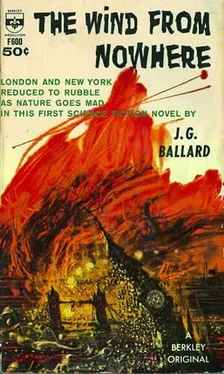The guard shrugged. "Wait till you see the bunkers. They're like a ship's bilge."
"But the walls aren't actually moving, surely?" Maitland examined one of the hairline cracks high up on the ceiling. It widened as it neared the floor. Below their feet it was at least six inches broad, the opposing lips only held together by the net of reinforcing bars. Water seeped through steadily, fanning out across the cement.
"A couple of engineers from Construction were down here yesterday," the guard confided. "They were talking about the underground stream loosening the ground or something."
"You'd better warn the old boy," Maitland said. "He's liable to be cut off if this tunnel fills up."
"He'll be O.K. He's got everything he needs up there. Refrigerators full 0f food and water, his own generator."
The guard looked uneasily along the tunnel. As they stepped through the tunnel and waited for Kroll to join them, Maitland glanced back and saw that the tunnel dipped sharply in the center. The two sections inclined upward at an angle of two or three degrees.
With Kroll leading, occasionally stopping to shoulder Maitland ahead of him, they walked along a maze of corridors, stairways, and dimly lit ramps traversed by huge ventilator shafts and power cables. Generators charged continually, providing an unvarying background to the sounds of steel boots ringing on metal steps, voices bellowing orders. Now and then, through an open doorway, Maitland could see men in shirt sleeves slumped on trestle beds, crammed together among their gear in the minute cubicles.
They moved down a stairway toward the lowest level of the bunker system. Maitland estimated that at least 400 men were accommodated in the network of shelters, along with enough supplies to maintain them for six months. The corridors were lined with steel and wooden crates similar to the ones he had seen in Marshall 's warehouse, overflowing from the big store chambers he had glimpsed on arrival.
Finally they emerged into the lowest level and entered a damp narrow cul de sac, at the end of which a couple of guards idled under a single light. They pulled themselves to attention as Kroll appeared and saluted him quickly, then unlocked a small door in the right-hand wall.
Kroll jerked his thumb at Maitland, bundled him brusquely through the doorway and slammed it behind him.
Maitland found the others inside, sitting on the beds around the wall, in the dull red gloom of a single storm bulb mounted over the door. Lanyon let out a low cheer when he saw Maitland, and helped him off with his jacket. Patricia Olsen lit him a cigarette, and Maitland stretched out gratefully on one of the hard horsehair mattresses.
"You've seen him, have you, Doctor?" Lanyon asked when Maitland had rested. "He told you all about his moral stand against the hurricane?"
Maitland nodded, his eyes half closed with fatigue. "The whole thing. He even showed me the wind tapping at his magic window. He's obviously out of his mind."
"I'm not so sure," Bill Waring, the other reporter, chipped in. He sat on his bed, pensively smoking a cigarette. "In fact, his instinct of self-preservation may be stronger than we think. This is the most organized set-up I've come across. Three or four hundred trained men, half a dozen big vehicles, a radio station, agents all over the country-it's a really well-run military unit. The moral stand is probably just the sauce. I figure we ought to look ahead to the next stage, when the wind dies down and he finds he really can run the whole show if he wants to."
Patricia Olsen, resting on another of the beds, nodded in agreement. "He'll discover some other moral drive then, of course." She shuddered, only half playfully. "Can you just see friend Kroll as executive vice-president?"
Lanyon smiled at her. "Relax. As long as Hardoon wants an attractive newswriter around you'll be safe." He turned to Maitland, lowering his voice and glancing back at the door. "Seriously, I've been trying to think up some way of getting us out of here."
"I'm with you," Maitland said. "But how?"
"Well, I was just explaining to Pat and Bill that probably the quickest method is for them to play along with Hardoon, produce a highly colored extravaganza about this lone hero outstaring the wind and so on. If he's sure we're sincere we can probably sell him on the idea that the story should be given a worldwide spread immediately."
"To encourage everyone," Bill Waring concluded. "Help us keep our chins up. I agree, it's the best bet."
Pat Olsen nodded. "We could easily do it. If he's got a cine camera around here we could even take some shots of him at his peephole." She shook her head ruefully. "My, oh my, but he really is a gone one."
"Where are the radio operator and the driver?" Maitland asked.
"They joined the local forces," Lanyon said. With a smile he added: "Don't look so shocked; it's an established military tradition. Kroll even offered to make me corporal."
For five days they remained sealed within the bunker. The doors into the corridor remained locked. Food was brought to them twice a day by two guards, but apart from an occasional routine check they were left virtually alone. The guards were curt and uncommunicative, and conveyed that some sort of activity was taking place on the upper levels which occupied most of the personnel for much of the day and night.
Their bunker was on the lowest level of the system, some 200 feet below ground. The corridor led past a small washroom to a spiral staircase which carried upward to the next level, and Maitland's impression was that a large number of similar annexes had been built out off the main group of shelters.
The air, carried to them by a small ventilator, was damp and acrid, often mixed with the fumes of diesel engines, constantly varying in pressure from a powerful blast that chilled the room, spattering everything with an oily dust, to a low drift of warm air that made them sluggish and uncomfortable.
Maitland traced this to carbon-monoxide contamination, and asked one of the guards if he could check the inlet pipe, presumably mounted in the transport bays. But the man was unhelpful.
While Pat Olsen and Waring began to concoct their story of Hardoon's stand against the wind, Lanyon and Maitland did what they could to plan an escape. Maitland made several requests for an interview with Hardoon; nothing, however, came of this. Nor could he gain any news of Andrew Symington.
One thing they were spared-the monotonous drone of the wind. Deep in the bunker, they could hear nothing except the tap leaking in the washroom, the sounds of metal shoes slamming on the staircase above. Their energy dulled by the news that there was no sign of the wind's abatement-in fact, the speed had risen steeply now to 550 mph-they slumped about on the beds, half asleep, drugged by the carbon-monoxide fumes.
Waking some time after midnight, Maitland stirred, trying to return to sleep, then lay on his back in the thin red gloom of the storm bulb, listening to the sounds of his companions asleep. His bed was beside the door, with Lanyon at his feet, Waring and Pat Olsen along the far wall below the ventilator.
Outside in the corridor a few night sounds shifted through the darkness-steam pipes chuntering, orders being shouted, freight loaded or unloaded in one of the storerooms on the next level.
Sometime later he woke again and found himself sweating uneasily. Everything around him was strangely quiet, the breathing of his companions obviously labored.
Then he realized that the ventilator had stopped, its steady bellowslike action no longer overlaying the other noises in the bunker.
One sound alone stood out-the regular ping, ping, ping of a dripping tap, falling into a basin of water only a few feet away from him.
Inclining his head, Maitland suddenly saw the drip move through the air, the minute sparkle of light reflected in the red storm lamp.
Читать дальше









